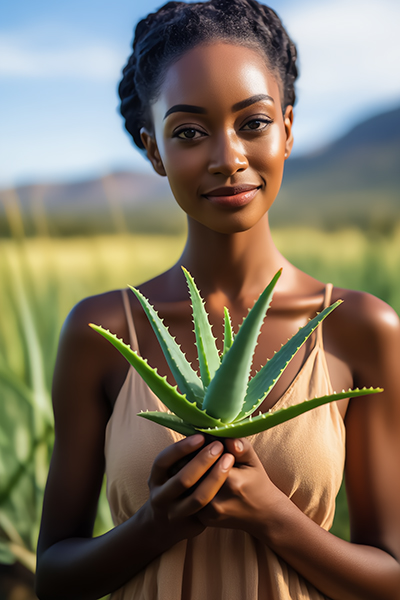No products in the cart.: $0.00
Aloe Vera

Aloe Vera (Aloe barbadensis miller) is a succulent plant used in skincare, haircare, and medicinal products for its soothing, hydrating, and healing properties. The clear gel extracted from its leaves is a popular ingredient in gels, creams, serums, and masks, valued for calming irritation, moisturizing skin, and promoting repair.
What is it Made of?
Aloe Vera gel is harvested from the inner leaf pulp of the Aloe plant through manual filleting or mechanical extraction, then processed (filtered, stabilized) to remove irritants like aloin. Its key components include:
-
- Water (~99%): Lightweight hydration base.
- Polysaccharides (e.g., acemannan): Enhance moisture retention and wound healing.
- Vitamins: A (cell turnover), C (brightening), E (antioxidant).
- Minerals: Zinc, magnesium, calcium for skin health.
- Amino Acids: Support skin regeneration and elasticity.
- Enzymes (e.g., bradykinase): Reduce inflammation and promote gentle exfoliation.
- Phenolic Compounds: Provide antimicrobial and anti-inflammatory effects.
- Anthraquinones (e.g., aloin, trace amounts): Offer mild antibacterial properties but are minimized in cosmetics to avoid irritation.
It’s vegan, biodegradable, and aligns with clean beauty when sustainably sourced.
Best Skin Type for Using It:
Aloe Vera is versatile and suitable for most skin types:
-
- Sensitive Skin: Soothes irritation, redness, and inflammation, ideal for rosacea or eczema.
- Oily or Acne-Prone Skin: Lightweight, non-comedogenic, and antimicrobial, it hydrates without clogging pores and may reduce acne-causing bacteria.
- Dry or Dehydrated Skin: Hydrates and locks in moisture, alleviating flakiness.
- Combination Skin: Balances hydration across oily and dry areas.
- Mature Skin: Supports repair and elasticity, reducing fine lines with mild antioxidant benefits. Caution:
- Allergic Sensitivities: Rare, but those with Aloe allergies or sensitivity to anthraquinones should patch-test, as unprocessed Aloe may irritate.
Avoid: On open wounds or severe burns without medical advice, as it may delay healing in rare cases.
Benefits of Aloe Vera
-
- Hydration: Acts as a humectant, drawing and retaining moisture for soft, plump skin.
- Soothing: Calms redness, irritation, and inflammation from sunburn, acne, or eczema.
- Anti-Inflammatory: Reduces swelling and discomfort via enzymes and polysaccharides.
- Antimicrobial: Inhibits bacteria and fungi, aiding acne management and minor wound care.
- Healing: Promotes tissue repair for burns, cuts, scars, and stretch marks.
- Mild Exfoliation: Enzymes gently remove dead skin, improving texture and brightness.
- Antioxidant Protection: Vitamins C and E combat free radicals, supporting anti-aging.
Pros and Cons of Aloe Vera
Pros:
-
- Natural, plant-derived, and biodegradable, aligning with clean beauty.
- Gentle and non-comedogenic, suitable for sensitive, oily, and acne-prone skin.
- Multifunctional: Hydrates, soothes, heals, and protects.
- Lightweight and non-greasy, ideal for layering in routines.
- Supports hair and scalp health, reducing dryness and dandruff.
- Affordable and widely available in gels, creams, and serums.
Cons:
-
- Limited Potency: Lacks intense anti-aging or pigment-correcting benefits compared to retinol or niacinamide.
- Allergic Potential: Rare, but Aloe allergies may cause irritation or rash.
- Quality Variability: Low-quality or heavily processed Aloe may contain additives or lack active compounds.
- Short Shelf Life: Pure Aloe gel spoils quickly without preservatives; store refrigerated.
- Mild Irritation: Unrefined Aloe or high concentrations may sting sensitive skin or open wounds.
- Not a Cure-All: Overhyped for some claims (e.g., dramatic scar removal), with limited evidence for advanced benefits.
Aloe Vera, derived from the inner leaf gel of the Aloe barbadensis plant, is widely used in skincare for its calming, moisturizing, and anti-inflammatory properties. Rich in polysaccharides, vitamins, and enzymes, it hydrates sensitive, oily, or dry skin while promoting repair and reducing redness, though its effects are more supportive than intensive for advanced skin concerns.
Disclaimer:



